The triathlete who conquered Barkley
A week ago triathlete and ultrarunner John Kelly became the 15th person since 1986 to conquer the infamous Barkley Marathons – a ultra difficult 100 mile trail race in the Frozen Head State Park in TN. The race was inspired by the 1977 escape of James Earl Ray from the nearby Brushy Mountain State Penitentiary. According to Wikipedia, Ray only managed to get 8 miles away from the prison after a 55 hour effort, and Gary "Lazarus Lake" Cantrell started to organize the race because he thought he could do at least 100 miles. But he made the race so tough and difficult that most participants over the years have failed on the course, and as we mentioned earlier – only 15 individuals have managed to complete the challenge.
There is also a well done documentary about this race on Netflix and it is called "The Barkley Marathons: The Race That Eats Its Young."
John Kelly finished 2nd overall at the 2016 Ironman Maryland and grabbed a Kona spot there. But this humble Every Man Jack athlete had unfinished business at the Barkley Marathons and talked to us about that experience and more.
Slowtwitch: Thank you for your time John.
John Kelly: Thank you very much for having me.
ST: Have you been sleeping well since the race?
John: Not as well as you’d think or hope for unfortunately. Life doesn’t stop while I’m out there at the Barkley, and I’ve had a lot to catch up on since the race. That, plus the aches and pains from the race don’t always make sleep easy. I’m slowly catching up on it, though.
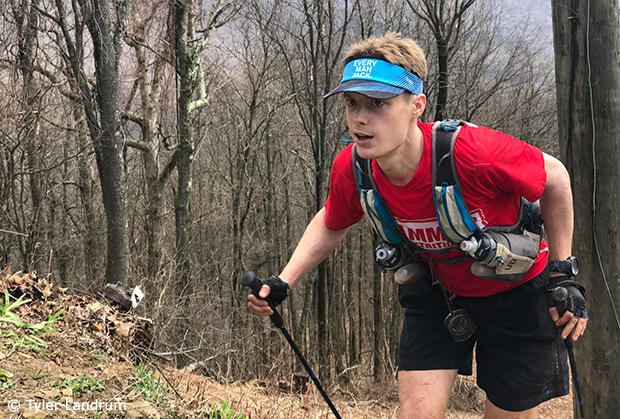
ST: Are you still sore?
John: My muscles are doing fine, but overall this one is definitely taking me a while to recover from. The toll that that 5th loop took on me appears to have been far greater than the 4+ loops last year. Most of what remains, though, is mental fatigue and sleep deprivation, along with some feet issues.
ST: As you mentioned, in 2016 you also were in the Barkley Marathon, but along the way a few things went wrong and while you started the 5th and final lap, you did not go very far on that lap.
John: I had some unfortunate navigational errors in 2016, and those ate into my time so that I wasn’t able to get any sleep during the race. I got one book on the 5th loop, but then started to really lose it to sleep deprivation. I wasn’t able to think clearly and I was having trouble identifying what was real and what was just in my head. Eventually I had to face reality that I didn’t have enough time left and slowly made my way back to camp in my incoherent half-asleep state.
ST: Is it not correct that from 1985 until 2016 no one other than the 14 finishers had reached and started lap 5?
John: There have been times where other people have made it to the final loop and then failed (Andrew Thompson’s 2005 5th loop hallucinations and resulting race report are legendary), but everyone who had failed on the 5th loop finished the race in a future year. After 2016, that left just myself and Gary as having failed on loop 5 but never finishing.
ST: You have participated in various triathlons including a fine second overall place at IRONMAN Maryland. Maybe you can explain to our readers how a lap in the Barkley Marathon compares to a lap in triathlon or other sports.
John: It’s really hard to compare the two, as they place very different demands on the mind and body. Barkley as a whole is far beyond the difficulty of an Ironman, but as far as what percentage of Barkley = an Ironman, that’s probably going to vary for different people depending on their capabilities and goals. Barring huge navigational mistakes, finishing a loop of Barkley in any amount of time is probably roughly equivalent in difficulty to finishing an Ironman. Completing a Barkley Fun Run (3 loops, within time limits) is probably roughly equivalent to qualifying for Kona. Then those last two loops scale up the difficulty tremendously due to the fatigue and sleep deprivation you're facing by that point. Ironman requires multiple disciplines and much more sustained high intensity output at or around lactate threshold, but it can’t compare with the overall toll that Barkley takes both physically and mentally (muscular fatigue, joint pain, blisters, bruises, briars, sleep deprivation, GI issues, and an incessant psychological battle against a voice telling you that you should just give up).
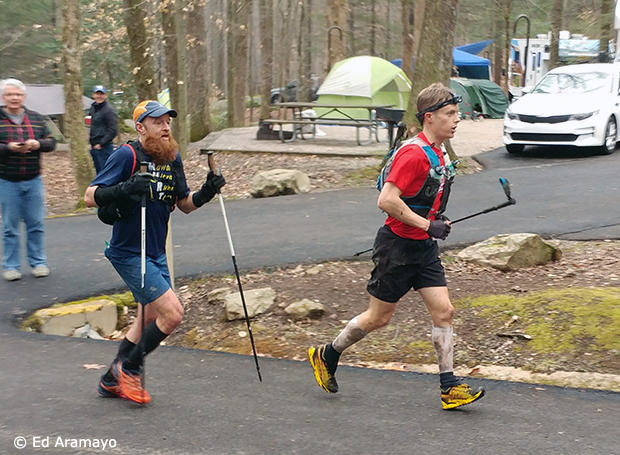
ST: But what about finding the way? In an Ironman you have tons of volunteers and signs.
John: Oh that’s absolutely a huge factor. I’ve been known to swim off course by a decent amount in triathlons, but the mental focus Barkley takes just to stay on course is huge. You can’t ever really zone out and focus all your mental energy on the physical challenges; even a momentary lapse can result in a small mistake that quickly snowballs into a race-ending disaster.
ST: When did that idea first come up to challenge that course in TN and maybe that man Gary “Lazarus Lake” Cantrell?
John: I grew up right across the street from the course. My family has been on that land for 200 years and those mountains are deeply personally meaningful to me. I had long looked at it as a bit of a pipe dream, and it wasn’t until a few years ago that I really got serious about it and decided to try to make something of that dream.
ST: Homefield advantage?
John: Having my family there to help me and not really having to worry about logistics has been a huge benefit in a race that already has so many other things to worry about. I also went into it my first year with a good understanding of the terrain and how to get around it. And some of the things that people view as big challenges such as briars, dense thickets, steep slopes, etc. are things that I just always accepted as normal when I was a kid exploring the woods. Not needing to expend any energy or time being surprised by those or figuring out how to deal with them was probably also an advantage.
ST: What did you do to prepare for the Barkley in 2016?
John: A lot of hill work, and a lot of mileage. I made a post about my training on my blog: http://www.randomforestrunner.com/2017/03/28/2017-barkley-marathons-training/. I differ a bit from a lot of people training for Barkley, as I do still focus on getting good mileage and intensity and try to not let my biking and swimming completely rust over.
ST: As a husband and father of 3 kids and with a fulltime job, how do you juggle your training?
John: Almost all of my weekday training is as my commute. I take time that I would otherwise be wasting in a car or on the metro and get “free” training hours out of it (and save a lot of money on metro fares). On weekends I try to do things early before the kids are up, or force myself onto the treadmill or trainer so that I can be home while the kids nap or play and free my wife up to do something else. For triathlons, swimming is the most difficult for me because I can’t do it in my basement or as part of my commute.
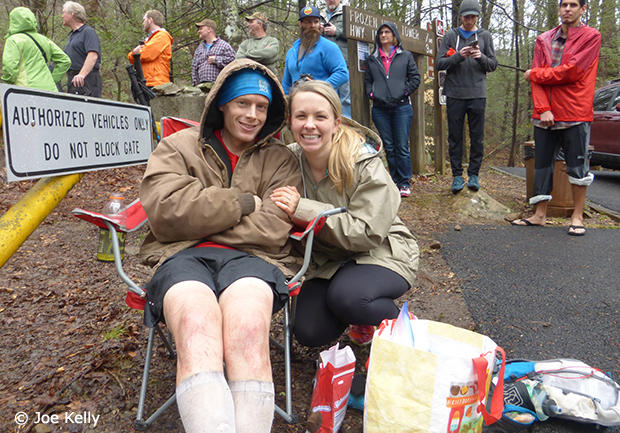
ST: Are you also commuting by running? Or is that all done via bike?
John: When I’m training for ultras during the winter I’m commuting by run 4-6 times a week and generally just bike on the trainer. When I’m in triathlon season in the summer I commute by run twice a week and by bike 4-6 times a week.
ST: Talk about your day job.
John: I’m the Director of Analytics for QxBranch, a startup in DC that focuses on data analytics and quantum computing software. I lead a team of data scientists in pulling useful, actionable information from massive, complex datasets. It’s extremely rewarding work: I get to work with some incredible technologies and apply them to a wide variety of problems. I’m also extremely fortunate to have the support of my team and to have the schedule flexibility to work my training in and show up to the office in workout clothes.
ST: Are you the only person in the office with big endurance sports ambitions?
John: One of the founders of our company is a former US national team rower, so having him around to discuss training and to understand some of the things I’m going through is pretty huge. Otherwise, though, I’m the only one with any sort of competitive or serious sports ambitions.
ST: How long did it take you after the 2016 event to decide that you wanted to return for 2017?
John: It was pretty immediate. After 2015 it took a bit of time, but after coming so close in 2016 there wasn’t really a question. A few weeks after the event my wife and I found out we were having twins and that gave us a bit of hesitation as to whether 2017 would be the year, but we decided to stick to it.
ST: Was it difficult for you to get an entry and how much was it?
John: It’s extremely difficult to get in the first time, unless you have top-end elite credentials, but after my initial performance it was a pretty sure thing that I would get back in. The entry fee is $1.60 plus a license plate (if it’s your first year) or a designated clothing item (it you’re a veteran). It’s a far cry from Ironman fees, that’s for sure.
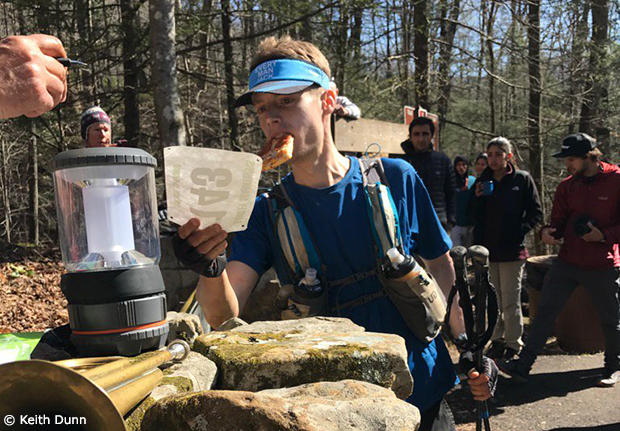
ST: So what clothing item did you bring?
John: It was a pack of white socks this year. Last year it was a t-shirt from a foreign city and I brought an Adelaide Crows shirt (Australian rules football) as that’s where part of our company is located.
ST: What did you do differently this year and did you make changes in terms of your preparation?
John: Honestly, not a ton was different. I did work more high intensity runs into my daily commutes and I had a bit of a different mindset: I was approaching the race with excitement rather than anxiousness. The most important thing, though, was just more experience out there and a better race strategy.
ST: Did you go 59:30 without sleep or did you schedule some naps?
John: I took a short nap after loop 2. Normally you wouldn’t take one until after loop 3 or 4, but with the early start this year loop 2 ended at night and loop 3 in the daytime and you never want to waste daylight napping. I also took a few naps on the course during loop 5, two of them intentionally. Overall I probably got 45 minutes to an hour of sleep during the race, and about half an hour before the race’s 1:42 AM start.
ST: What was the hardest element of that race for you?
John: The fog and the sleep deprivation on loop 5. The fog we faced at the beginning of the race at night was unbelievable and made navigation a nightmare. With your headlamp bouncing back off of it you could hardly see your own hand stretched out in front of your face. On the 5th loop dealing with the sleep deprivation to keep moving forward and stay focused was probably the toughest mental battle I’ve ever fought.
ST: What words did you have with Gary Robbins after the event?
John: I told him that I knew what he accomplished, and so did everyone who knew anything about the race. He should be incredibly proud of what he did and it was a huge honor to run with him for 4 loops. I know that he’ll want to go back and get that official finish, but I’m no less impressed by what he did than by any finish.
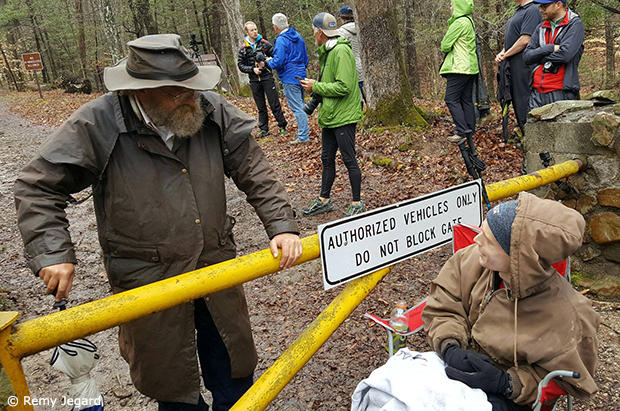
ST: Do you remember what Lazarus Lake said after you did it?
John: He congratulated me, said how he remembered when I sent in my first application years ago, and said something about how great it was to see the local boy do it. I think we talked about my last loop some too.
ST: And talk about that orange ski hat you found.
John: I was getting really cold in the rain and wind going up Rat Jaw, and there’s a decent amount of trash there in the briars. I was just looking for anything that could help me stay warm. First I found the grocery bag and tried to use it as a poncho, then when I saw the hat it was the find of a lifetime. It definitely gave me a good deal of added warmth. It’s also pretty funny that in 2016 I lost a hat on Rat Jaw when the briars ripped it out of my pocket.
ST: Did you keep that orange hat as a souvenir, or did you simply donate it to the trash?
John: Still have the hat and the bag.
ST: So what is next?
John: After recovery, I’ll switch over to triathlon season. I’m extremely excited to be part of Team Every Man Jack this year and I’m fortunate to already have my Kona slot for this year. I’ll be focusing on that, with a few other races over the summer as well (70.3 Syracuse, Lake Placid, and a few local Olympic distance events).
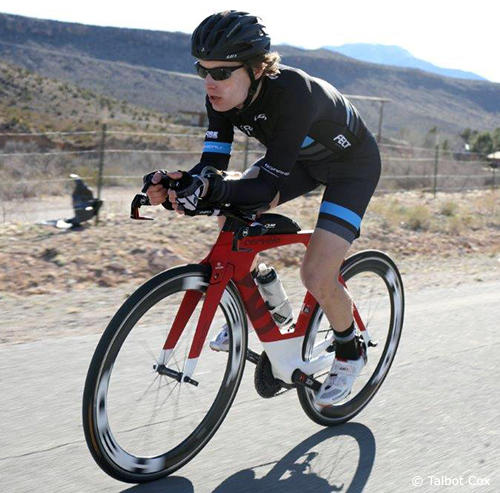
ST: What do you like most about triathlon?
John: I love adding in the bike and feeling that speed. Trail running will always be my favorite, but when it gets hot in the summer there are few things I love as much as a long bike ride on good roads. For races, I even enjoy the swimming too, and having the opportunity to combine multiple disciplines into a single race is an exciting, unique element that I really love. What I don’t love is the need to buy speed to compete near the top as an amateur. I do it of course, but it’s really nice to know in an ultra that as long as I can afford a pair of shoes it’s a pretty level playing field.
ST: You have also run in Boston. What is your fastest standalone marathon time?
John: I ran a 2:49 in the fall of 2014 as my Boston qualifier. Training for a standalone marathon and going for a big PR is something that I really want to do in the near future. I’ve improved pretty dramatically over the past 3 years and I believe I can do much better. I ran a 2:53 at Ironman Maryland last year.
ST: Do you have any races on your bucket list?
John: Kona is definitely on there, so I’m excited to check that off this year. Then I’d love to do some of the big western ultras at some point (e.g. Hardrock, Western States). UTMB would also be an incredible experience. Those would be a bit hard to do, though, with my current schedule of doing triathlons during the summer. On the triathlon side, it’d be awesome to go represent Team USA at Long Course Worlds.
ST: Is there anything else we should know?
John: I’m incredibly fortunate to have so much support from my incredible wife, family, and even co-workers. I can now tell my wife with outright honesty that I can finish Barkley, but I couldn’t do what she does: taking care of 3 kids under 3 every day while I’m at work and when I train. On top of that she helps me out with my training and racing. If people want to read any further on my Barkley experiences or keep up with anything else I’m doing, they can check out my blog at randomforestrunner.com


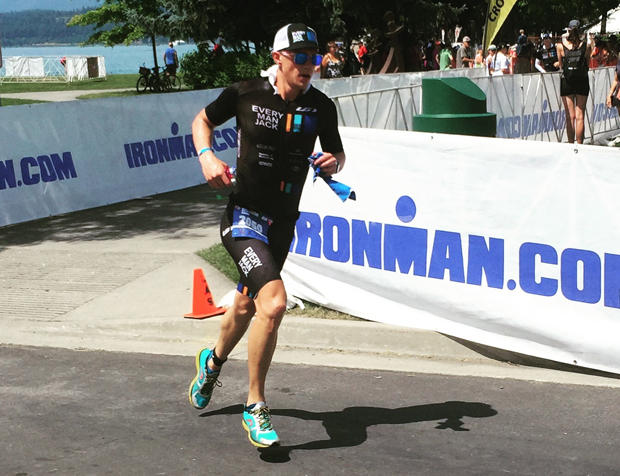
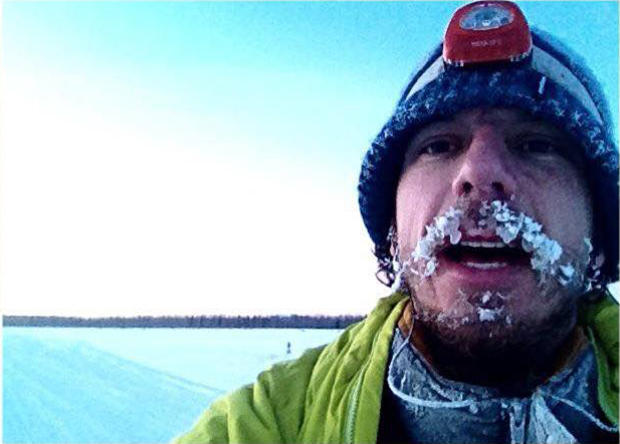
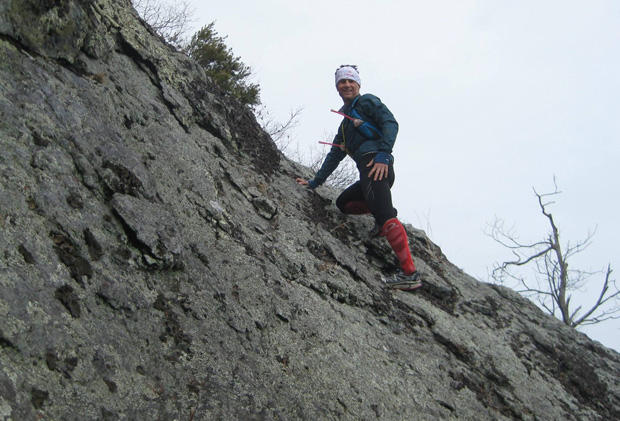
Start the discussion at slowtwitch.northend.network